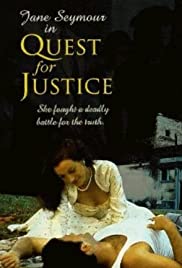
QUEST FOR JUSTICE
US, 1993, 91 minutes, Colour.
Jane Seymour, D.W.Moffatt, Richard Kiley.
Directed by James Keach.
Quest for Justice is a telemovie with a focus on race issues in Mississippi in the mid-'50s. It is a star vehicle for Jane Seymour, who was executive producer of the film along with her husband, James Keach, who also directed the film.
Along with Jane Seymour are D.W. Moffatt as her husband from the north and Richard Kiley as the leader of the town, a civilised bigot.
The film is the story of Hazel Brannon Smith, who ultimately won a Pulitzer Prize in the '60s for her newspaper articles on race issues. She appears at the beginning of the film as a socialite from the south, believing in segregation, but benignly so. A series of incidents raises her consciousness and she uses her paper to promote harmony between the races. However, she becomes the victim of the local racists, even with some activity from the Ku Klux Klan.
The film is designed for the popular television audience and so relies on story and strong characters rather than depth of exploration of theme. However, it is quite a moving film at its own level and would contribute to respect between the races.
1. The impact of the telemovie? For popular American audiences at home? Impact outside America? American race issues of the '50s? Their relevance to the present? To race issues throughout the world?
2. The atmosphere of Mississippi in the 1950s? The train and the railway line and station? The beautiful mansions? The black areas of the town? The town itself, halls and churches, shops and printing press? Authentic atmosphere? The atmospheric score from the south?
3. The title and its focus on Hazel and her mission?
4. The film as a portrait of and tribute to Hazel Smith? Jane Seymour's screen presence, her style (and accent)? An active and extroverted young woman? Arrival home, the joy, bringing her husband? Her friends in town? The parties and receptions? Her enjoying a good time and being a hostess? Her wealth? Her relationship with her black servants? Her work at the paper? Her willingness to take advertising from black customers? The discussions with Earl about integration and reactions in the south? Her relationship with her husband, his getting a job administering the hospital? The opening sequence with the white trash on the road and the sheriff not helping? The clashes with the sheriff?
5. Hazel and her work for race issues? The black man being shot and her husband taking her to the hospital? The confrontation with Earl and his strategies against her? Invitation to the various clubs, her going to the meetings, reporting? The growing antagonism? The rednecks and their violent hostility, smashing of the printing machines, the Klan cross outside the house? The boycott of advertising, her financial ruin? Her being taken to court for contempt of court in speaking to the widow of the black man? Her willingness to help, give jobs in the renovation of houses? Her determination? The people from the north and printing their paper? Her being spied on, the printing press being smashed? The danger of going to the rendezvous - but receiving the money to set up a new press? The argument with her husband? The pathos of his death? The reaction of people in the town, her friends spurning her, taking other jobs to protect their own? The violence against her? Earl and his change of heart, bringing the townspeople to the funeral? The change of race attitudes in the town?
6. Earl, his presence in the town and his authority? His inherited racism? Yet his not wanting to be violent? Warning Hazel? Inviting her to participate in the committee? His control of the committee? Civilised strategies of racism? The boycott, the pressure for people to move jobs? His reaction against the sheriff and his violence? His losing, his change of heart, his bringing people to the funeral?
7. Hazel's husband, genial, from the north, puzzle about the initial reactions of the sheriff? His work in the hospital, his ordering the surgeon to help the black patient? His being fired - and the kangaroo court? His support of Hazel? His fear about her being trapped at the rendezvous? His accidental death? His funeral as a rallying point?
8. The people who worked at the paper? Anne and her work for advertising, racism, change of heart, supporting Hazel, her husband out of work and having to leave? The other women in the town and their boycotting her? The older woman defending Hazel in the hairdressers and shaming the others, her apology? The men in the town, the violence, the abuse of Hazel? The destruction of the printing presses?
9. The sheriff, the initial disregard of the man injured on the road? Member of the Klan? Differing views from Earl? His violence and shooting the black man? His being reprimanded? The confrontations with Hazel, his arresting her for contempt of court, the judge and his sneering attitude towards her? Her winning in the Supreme Court?
10. The servants in Hazel's household, the cook and her support but speaking truthfully to Hazel? Riley and his work at the printing press? The man out of work and the renovations - his being arrested, chased and beaten to death? The funeral and Hazel speaking to his widow and being arrested? The black campaigners from the north?
11. A film of the '90s looking back at American history? The need for this kind of film aimed at a popular audience to educate against racist attitudes?